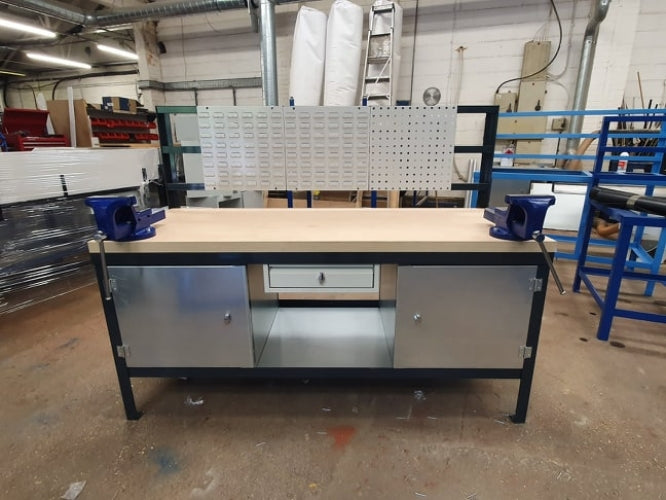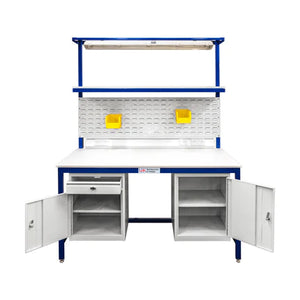0161 688 6737

Choosing a heavy-duty workbench: a comprehensive guide
You don’t purchase new equipment every day, so it is worth doing some research first – which is why we have compiled a comprehensive guide for choosing a heavy-duty workbench.
From keen hobbyists to professional welders, there is a wide range of potential customers for a robust workbench, and they all need to answer the same questions before reaching a decision. Whether you are ordering one or one hundred benches, you need products that deliver the required level of functionality.
So how do you start identifying the best heavy-duty workbench for you?
1. Understand your needs
Before you go browsing, it’s crucial to understand your precise requirements from a workbench. For example, consider the type of tasks you will be performing and how much worktop space you require. You might use heavy equipment, so calculate how much weight the bench will need to support. Look at the area of your workshop or factory and decide what size is most appropriate.
Finally, do you work in the same spot or move around your premises? This will determine if you need a static or mobile heavy-duty workbench. Having clear answers to these questions will guide your decision-making process.
2. The right material matters
Now that you understand your requirements, you can start to list the specifications for your new heavy-duty workbench. Galvanised steel worktops are extremely durable, can support very heavy loads, are resistant to wear and tear and are suitable for food preparation environments. However, the overall weight of the bench will increase.
Wooden worktops look less industrial, provide a smooth work surface but can be damaged by liquid spills and heavy impacts. Typically, wood supports less weight than steel.
3. Weight capacity
One of the most critical safety factors is the weight capacity of the workbench. Ensure the bench you choose can comfortably handle the heaviest items you’ll be working with. Overloading a workbench not only risks damaging the bench but also poses a safety hazard.
Here at UK Workbenches, our strongest benches are designed to accommodate up to 1,000kg of uniform distributed load (UDL) without compromising stability or longevity. If you require less weight capacity, you could opt for a medium-duty workbench.
4. Size and space
Measure your workspace area to determine the ideal size of your workbench. Consider both the length and width to ensure it fits comfortably without cramping your movement. Don’t forget to account for any additional features like drawers or shelves that may require extra space.
Many suppliers only offer a limited range of standard sizes, but UK Workbenches build custom products so you can get the exact size you require.
5. Optional extras for heavy-duty workbenches
Increase your productivity and efficiency by choosing from a range of options for your workbench. For example, you could add drawers for storing small parts, secure cupboards for harmful chemicals, shelves, lighting, powerpoints and tool panels to keep your equipment within easy reach.

6. Budget
While it’s tempting to opt for the cheapest option, remember that quality is worth the investment. A good product can last decades if properly maintained. Depending on your size and specification, our heavy-duty workbenches start from around £400 (including VAT).
Need more information about heavy-duty workbenches?
Choosing the right heavy-duty workbench is about balancing your specific needs with the features and durability available. By considering the factors listed above, you can find a bench that will offer years of reliable service.
If you would like more information on our range of high-quality workbenches and tool trolleys, visit our online store or contact our friendly team who are always happy to answer your queries.
